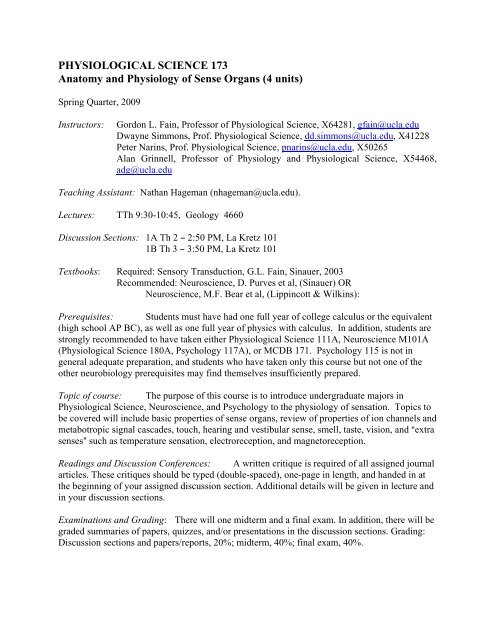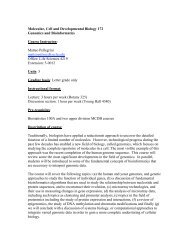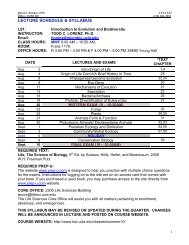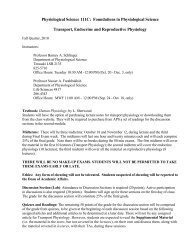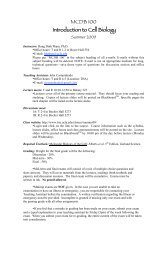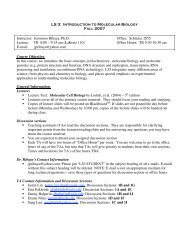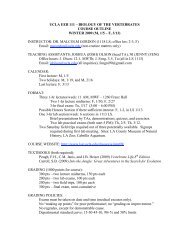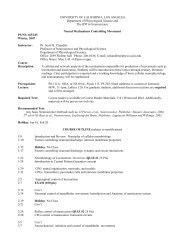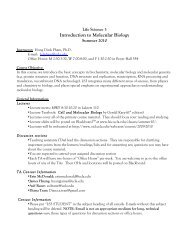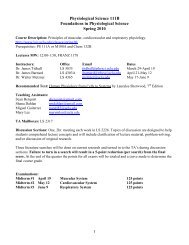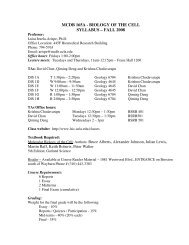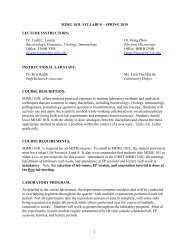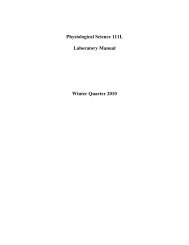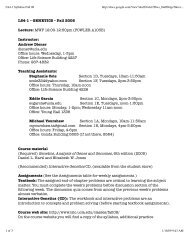Syllabus - UCLA
Syllabus - UCLA
Syllabus - UCLA
You also want an ePaper? Increase the reach of your titles
YUMPU automatically turns print PDFs into web optimized ePapers that Google loves.
PHYSIOLOGICAL SCIENCE 173Anatomy and Physiology of Sense Organs (4 units)Spring Quarter, 2009Instructors:Gordon L. Fain, Professor of Physiological Science, X64281, gfain@ucla.eduDwayne Simmons, Prof. Physiological Science, dd.simmons@ucla.edu, X41228Peter Narins, Prof. Physiological Science, pnarins@ucla.edu, X50265Alan Grinnell, Professor of Physiology and Physiological Science, X54468,adg@ucla.eduTeaching Assistant: Nathan Hageman (nhageman@ucla.edu).Lectures: TTh 9:30-10:45, Geology 4660Discussion Sections: 1A Th 2 B 2:50 PM, La Kretz 1011B Th 3 B 3:50 PM, La Kretz 101Textbooks: Required: Sensory Transduction, G.L. Fain, Sinauer, 2003Recommended: Neuroscience, D. Purves et al, (Sinauer) ORNeuroscience, M.F. Bear et al, (Lippincott & Wilkins):Prerequisites: Students must have had one full year of college calculus or the equivalent(high school AP BC), as well as one full year of physics with calculus. In addition, students arestrongly recommended to have taken either Physiological Science 111A, Neuroscience M101A(Physiological Science 180A, Psychology 117A), or MCDB 171. Psychology 115 is not ingeneral adequate preparation, and students who have taken only this course but not one of theother neurobiology prerequisites may find themselves insufficiently prepared.Topic of course: The purpose of this course is to introduce undergraduate majors inPhysiological Science, Neuroscience, and Psychology to the physiology of sensation. Topics tobe covered will include basic properties of sense organs, review of properties of ion channels andmetabotropic signal cascades, touch, hearing and vestibular sense, smell, taste, vision, and Aextrasenses@ such as temperature sensation, electroreception, and magnetoreception.Readings and Discussion Conferences: A written critique is required of all assigned journalarticles. These critiques should be typed (double-spaced), one-page in length, and handed in atthe beginning of your assigned discussion section. Additional details will be given in lecture andin your discussion sections.Examinations and Grading: There will one midterm and a final exam. In addition, there will begraded summaries of papers, quizzes, and/or presentations in the discussion sections. Grading:Discussion sections and papers/reports, 20%; midterm, 40%; final exam, 40%.
Schedule of Lectures:PS 173 Spring ‘09Lecture # Date Topic Lecturer1 Tu March 31 Intro to Sensory Systems GLF2 Th April 2 Taste GLF3 Tu April 7 Mechanoreception PMN4 Th April 9 Lateral Line PMN5 Tu April 14 Vestibular System I DDS6 Th April 16 Vestibular System II DDS7 Tu April 21 Auditory System I- Anatomy PMN8 Th April 23 Auditory System II- Transduction PMN9 Tu April 28 Auditory System I- CNS PMN10 Th April 30 Hearing and Localization in Owls ADG11 Tu May 5 MT1 (Lectures 1-9)12 Th May 7 Bat Echolocation ADG13 Tu May 12 Bat Echolocation ADG14 Th May 14 Electroreception &ADGMagnetoreception15 Tu May 19 Olfaction I GLF16 Th May 21 Olfaction II GLF17 Tu May 26 Vision I GLF18 Th May 28 Vision II GLF19 Tu June 2 Vision III GLF20 Th June 4 Sensory Pathway Plasticity ADGFinal Exam (lectures 10-20): Tuesday, June 9, 2009, 11:30am-2:30pm


